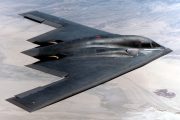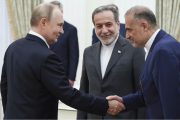
The United States and Germany are resisting calls by other NATO members to invite Ukraine into the bloc at a major summit later this year, worried that the move could spark a full-scale clash with Russia, Foreign Policy (FP) magazine reported on January 30.
Quoting various current and former officials, the American news magazine reported that both Kyiv and some of its most enthusiastic backers, including Poland and the Baltic states, are lobbying for Ukraine to be accepted into the U.S.-led alliance during a major summit in Washington, D.C., in July.
Supporters of accelerating Ukraine’s NATO bid contend that only full-fledged membership for Kyiv could compel Russia to end the conflict, and claim that the move would be less costly in the long run than seemingly never-ending arms shipments to Kyiv. This is despite Russia’s constant claim that Moscow is ready for peace talks.
However, as per the article, the U.S. and Germany, the two top supporters of Ukraine in terms of military aid, do not agree with these proponents of Ukraine’s NATO membership. Officials from the two countries reportedly think that although Kyiv should be a NATO member, now is not the right time, and say that the West should instead focus on supplying Ukraine arms.
FP added that welcoming Ukraine into the bloc while it is locked in a conflict with Russia could spark a full-scale clash between NATO and Moscow, as per Article 5 of the alliance’s treaty, which stipulates that an attack on one member of the bloc is an attack on all members.
According to FP, several EU members, including Hungary and Slovakia, have opposed sending arms to Ukraine. Hungarian Prime Minister Viktor Mihály Orbán has warned that Kyiv’s membership in the bloc could draw NATO into the conflict. His Slovak counterpart, Robert Fico, has said the move could ignite a third world war.
The U.S. has reportedly urged EU members not to broach the issue at the summit, arguing that it could cause behind-the-scenes divisions.
Moscow has repeatedly cautioned the West against providing military aid to Ukraine, saying it will only prolong the conflict. Russian President Vladimir Putin has also said that Kyiv’s push to join NATO, which was enshrined in its constitution as a strategic objective in 2019, was one of the major reasons for Russia’s actions in Ukraine.
On January 31, Putin stated that Kyiv’s forces used an air-defense system supplied by Washington to attack a Russian aircraft carrying Ukrainian POWs for a pre-scheduled exchange.
The attack, which took place last week, killed 65 Ukrainians on board, as well as the plane’s crew and three Russian military personnel.
“The plane was downed … by a US-made Patriot system,” Putin said, calling it a “well established” fact that had been verified by an expert review. Russian emergency services had previously stated that fragments of one or more missiles had been discovered at the crash site.
Investigators have not officially verified the results of the ongoing probe into the incident. However, sources close to the investigation told the TASS news outlet that an analysis of the plane’s black box data showed that it had been intentionally shot down. A source also told the news agency that it was “highly probable” that a U.S.-supplied Patriot surface-to-air missile system was employed in the attack.
Last week, a French military source told the nation’s state broadcaster Radio France that Kyiv’s forces used a Patriot missile to down the plane. The Russian Defense Ministry slammed the Ukrainian military for being behind the attack soon after the incident, adding that Kyiv was aware of the fact that the aircraft was transporting Ukrainian POWs.
Ukrainian leader Volodymyr Zelensky challenged Moscow’s version of events on January 31 and called for an international probe into the incident. Putin also said that Russia would call for an international investigation into the downed aircraft.
“I state this officially: We ask for international experts to be deployed [here] to conduct an analysis, assess the existing material evidence of the fact that the plane was downed by the Patriot system,” he posited.
Meanwhile, in his first public appearance since his appointment at the end of last year, Chinese Defense Minister Dong Jun told his Russian counterpart, Sergey Shoigu, that strategic cooperation between Moscow and Beijing is key for global peace.
As two great powers, Russia and China should boost their cooperation and decisively respond to global challenges, the defense chiefs agreed during a video call on January 31.
“We have supported you on the Ukrainian issue despite the fact that the US and the EU continue to put pressure on the Chinese side,” Dong stated, promising that Beijing “will not change or abandon our established policy course over this,” even under the threat of more sanctions.
At the same time, China feels “strong support from the Russian side on the Taiwan issue as well as on other topics of our key interests,” Dong added. “As the two most important and key forces in the world, we should decisively respond to global challenges.”
Beijing’s newly appointed defense chief contended that “the US is always targeting Russia and China, seeking to retain its hegemony around the globe,” adding that “history and the reality prove that hegemony is doomed to failure.”
Shoigu concurred, stating that, unlike Western states, Russia and China are not “creating military blocs,” and their military cooperation is not “directed against third countries.” The defense chief noted that “Russian-Chinese relations in the military sphere are developing steadily in all areas,” and said he was looking forward to “close, productive cooperation” with his Chinese counterpart.
China’s stance on the Ukraine crisis has put it at loggerheads with the United States, with some American officials accusing Beijing of actively backing Moscow instead of maintaining neutrality. Beijing has blamed NATO’s expansion in Europe for the crisis in Ukraine, and has denounced the use of unilateral sanctions by the U.S. and its allies as a method of geopolitical pressure.
Moscow regards the Ukraine conflict as part of a Western proxy war against Russia, which is being conducted in an attempt to preserve U.S. hegemony on the world stage. Chinese officials have said that Washington is stuck in a “Cold War mentality.”




